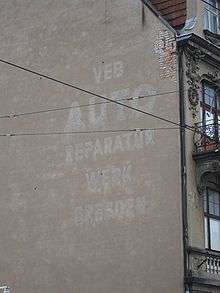Volkseigener Betrieb

The Publicly Owned Operation (German: Volkseigener Betrieb; abbreviated VEB) was the main legal form of industrial enterprise in East Germany. They were all publicly owned and were formed after mass nationalisation between 1945 and the early 1960s, and the handing back in 1954 of some 33 enterprises previously taken by the USSR as reparations.
The managing director of a VEB was called a plant or works manager (German: Werkleiter, Werkdirektor or Betriebsdirektor). He was assisted in his tasks by the first secretary of the factory party organisation (Betriebsparteiorganisation) of the SED, and the chairman of the factory trade union (Betriebsgewerkschaftsleitung). Subordinate to them were roles such as "Chief Accountant" and "Technical Director".
VEBs were initially vertically integrated into units called Associations of Publicly Owned Operations (Vereinigung Volkseigener Betriebe) or VVBs. A VVB existed in most major industries, to consolidate production and reduce waste. They had all been replaced by 1979 with the VEB Kombinate, or VEB Group, which integrated the VEBs much more closely than the largely administrative VVBs. Under this system, the term 'Kombinate' was frequently dropped and the term "VEB" usually implied the group rather than the individual factory. The organisation of all state enterprises was the responsibility of the State Planning Commission.
VEBs often had company sports teams, and played an important role in the promotion of sports.
In 1989, VEBs employed 79.9% of the East German workforce. After German reunification and the introduction of the market economy in 1990, the ownership of around 8000 publicly owned operations passed to Treuhand; the trust agency which oversaw the privatisation of GDR state property.
An honorary name was frequently added to the firm's actual name, for example, VEB Kombinat Chemische Werke "Walter Ulbricht" Leuna. This was an incentive towards fulfillment and overfulfillment. Many Germans, as a form of mild protest against the nationalization of private businesses, nicknamed the VEBs Vati's ehemaliger Betrieb, which translates to "Father's old business".[1]
Examples
- VEB Automobilwerk Eisenach
- VEB BMK Kohle und Energie
- VEB Braunkohlenwerk Gustav Sobottka Röblingen
- VEB Deutsche Schallplatten
- VEB Deutsche Seereederei
- VEB Elbewerften Boizenburg/Roßlau
- VEB Fahrzeug- und Gerätewerk Simson Suhl
- VEB Filmfabrik Wolfen
- Hochseeschiffbau Mathias-Thesen-Werft Wismar VEB
- VEB Motorradwerk Zschopau
- VEB Polytechnik
- VEB Planeta
- VEB Robotron
- VEB Sachsenring Automobilwerke Zwickau
- VEB Typoart
- VEB Uhrenwerke Ruhla
- VEB Volkswerft (Stralsund)
- Kombinat VEB Zeiss Jena
- VEB Lokomotivbau Karl Marx Babelsberg (LKM)
- VEB Lokomotivbau Elektrotechnische Werke Hans Beimler Hennigsdorf (LEW)
See also
- Volkseigenes Gut
- Landwirtschaftliche Produktionsgenossenschaft
- New Economic System
- Economy of East Germany
References
- ↑ Pilleul-Arp, Agnès (2005). "„VEB-GmbH": „Vatis ehemaliger Betrieb — geklaut mit besonderer Höflichkeit". Klein- und Mittelunternehmer in der DDR: Lebensläufe zwischen 1949 und 1990 im Vergleich" ["Father's old business - very politely stolen". Small and mid-sized entrepreneurs in East Germany: comparative life stories from 1949 until 1990]. Historical Social Research (in German). Köln, Germany: GESIS - Leibniz-Institute for the Social Sciences, Center for Historical Social Research. 30 (2 (112), "Entrepreneurs and Managers in Socialism"): 160–180. JSTOR 20762038.
